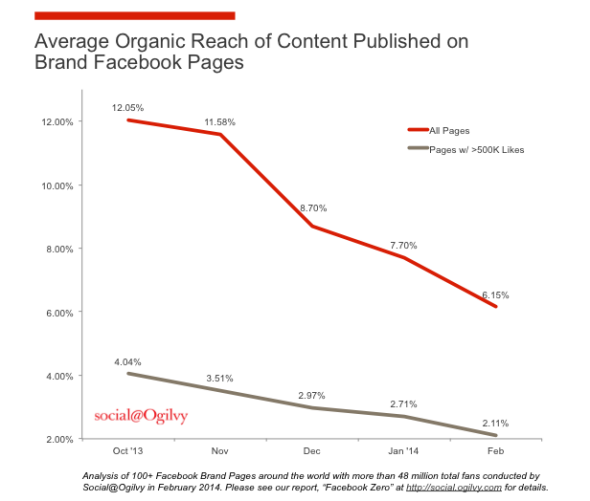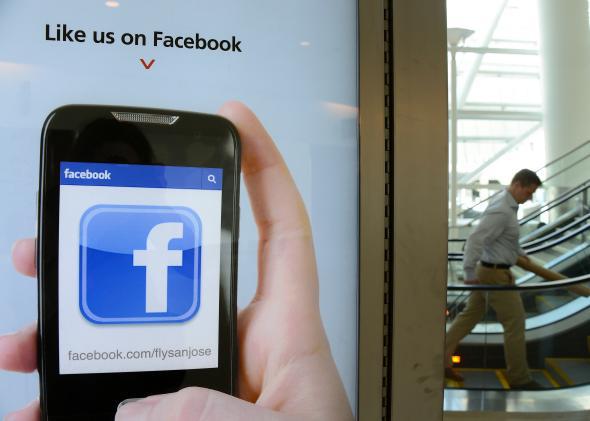Facebook is ending the free ride, wrote Valleywag’s Sam Biddle in a post that has been greeted with widespread alarm. No, it’s not forcing ordinary users to pay for its service or to share pictures of their babies. Rather, the claim is that it’s deliberately bringing an end to the era of free advertising for businesses via their Facebook pages.
Citing an anonymous source, Biddle reports that Facebook is in the process of slashing brands’ “organic page reach” to just 1 or 2 percent. That means only a tiny fraction of the people who have liked a business on Facebook will see each of its posts in their news feed, unless that company pays Facebook for wider promotion. The organic-reach squeeze would affect “all brands,” Biddle writes, from corporate behemoths like Nike to local merchants like New York’s Pies ‘n’ Thighs restaurant. He casts this as a cruel bait-and-switch on Facebook’s part:
Facebook pulled the best practical joke of the Internet age: the company convinced countless celebrities, bands, and “brands” that its service was the best way to reach people with eyeballs and money. Maybe it is! But now that companies have taken the bait, Facebook is holding the whole operation hostage.
That’s one way of looking at it.
Here’s another one: People don’t really like seeing a bunch of ads in their news feed. They like seeing updates from friends and family, funny YouTube videos, and maybe some news stories about topics they’re interested in. So Facebook has decided to show them fewer self-promotional posts from businesses and more of all the other stuff. Doesn’t sound quite so nefarious when you think of it that way, does it?
Nor is the great Facebook brand squeeze quite the juicy secret that it might seem. Forbes, Mashable, Marketing Land and others have been following the decline of brands’ organic reach for months. Even Facebook itself has been upfront about it, at least in its communications with marketers. “Facebook is being more blunt about the fact that marketers are going to have to pay for reach,” AdAge reported in December. And a study released earlier this month by Ogilvy PR found that organic reach for the site’s largest brands has already dropped to about 2 percent.

Image courtesy of Ogilvy Public Relations
A Facebook spokesman readily confirmed to me that the company’s news feed algorithms have been ratcheting down the reach of posts from brand pages. But he insisted that the change was designed to please the average user, not to wring more money out of advertisers. People are sharing more posts on Facebook than ever, he said, including far more news stories than they used to. That means tougher competition for the top slots on each user’s news feed. Something had to go, and it certainly wasn’t going to be the post from your best friend announcing her engagement.
The cynics among us will note that this is awfully convenient for Facebook. After all, the posts it’s squeezing out just happen to come from the group of Facebook users most likely to have an advertising budget. You don’t have to be a Facebook truther to spy a potential conflict of interest here.
In fact, it is convenient for Facebook—and it’s convenient for the rest of us, too. Remember, Facebook’s greatest vested interest by far is in keeping its billion-odd users coming back to the news feed as often as possible. If that requires keeping ads to a minimum, then it makes a lot of sense for Facebook to privilege the paid ads on which its business relies over the unpaid ads that serve only the interests of marketers. No one’s going to shed a tear if United Airlines finds it needs to shell out some money to get the word out to its fans, rather than just casually blasting them whenever it feels like it.
The real concern here is that the little guys—the Pies ‘n’ Thighs, the charitable causes, the artists and merchants trying to scrape by with the help of their Facebook fans—will find that they can’t reach even the users who really do want to see their updates. So far, the data suggest that they’re being spared the worst of it: It’s the pages with the most likes, upwards of 500,000, that are seeing the biggest drop-off in reach. But Valleywag’s Biddle is right about one thing: This should serve as a stark reminder to everyone who relies on Facebook for traffic that their fortunes are at Menlo Park’s mercy.
That said, there is some evidence to suggest that Facebook really is telling the truth when it says it’s only downgrading the types of posts that most people didn’t want to see anyway. To wit: Biddle’s post seems to imply that publishers like Gawker are being squeezed alongside the corporate marketers. But that doesn’t seem to be the case. In fact, Facebook referral traffic to media sites reportedly jumped 170 percent last year, presumably because people actually like seeing news stories and opinion columns in their news feeds.
It’s understandable that businesses feel cheated: They’ve spent years doing everything in their power to get people to like their pages, only to see their engagement dry up when Facebook changed things around. But maybe the lesson for marketers is simpler than it seems: Facebook likes are only as valuable as the actual sentiment behind them. That is, unless people genuinely like your posts—in the original sense of the term—getting them to hit like on your brand page isn’t going to do you a lot of good. And maybe that’s the way it should be.
Previously in Slate:
